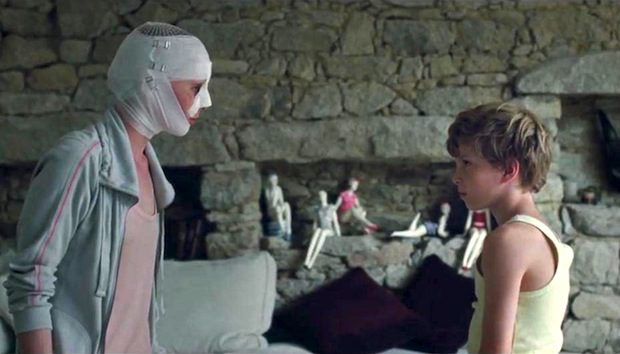A Mother Under Wraps

An Austrian television personality comes home to her remote, eerie house to recuperate from extensive plastic surgery. Swathed in bandages, she confronts her twin sons—and they don’t recognize her. She can’t persuade the boys that she’s their real mother, and her inability to remember basic information about her own life doesn’t help. She seems to scapegoat one of the boys as the troublemaker; she sometimes refuses to talk to him or even set a place for him at the table. The boys decide that this false mother is trying to tear them apart. They begin to resist her. She begins to get angry.
This is the basic setup for “Goodnight Mommy,” a chilling little thing that starts with a lullaby and ends with a conflagration. It would probably be fairly easy to guess the movie’s secret if it ever gave you a chance to breathe, but the suspense and dread ratchet up so relentlessly that there’s no time to think. This is a very effective psychological horror film, with supernatural hints.
The images are haunting: The huge photos that decorate the house, showing models with contorted limbs and faces turned away from the camera. The mother, whip-thin, standing before her mirror looking at her blank bandaged face. A cat sprawled on a heap of skulls; giant cockroaches crawling into a mouth, or out of a wound. The boys ramble through the different landscapes surrounding the house: the woods, the burning field, the cave, the lakes. All filled with dangers.
There are some heartbreaking images. The boys play a tape recording of their mother singing them to sleep, promising she’ll come home to them—but she’s already home, the woman who says she’s their mother. One of the boys crossing himself with holy water at the church, while the other one hurries up the aisle.
But for me the most striking element of the film was the way it made clear how little we know about what goes on inside a house. The boys don’t seem to have any friends, but the house does get several visitors. None of them understand what’s going on. There’s a sequence in which the boys run away, seeking refuge in a church. The priest doesn’t react the way I hoped-against-hope that he would; but it turns out that the audience is in the same position as these interlopers. We enter the family’s story in the middle and try to piece together its fragments. We don’t know it from the inside, and so we don’t know what to believe.
The mother’s bandaged face hides her features. The specific kind of surgery she had hides its meaning: Is she a fame-besotted celebrity seeking physical perfection? A trauma victim? Was the plastic surgery even real, or just an excuse to hide her true identity? And the house hides the truth of the family’s tragedy as well. The shutters can ring down, the doors can lock, and the house can look like a haven, a place of peace.
John Darnielle, the man behind the indie band the Mountain Goats, writes a lot of songs about houses that hide misery. The house is the family: the alcoholic couple whose “cellar door/is an open throat“; the abusive home in which Darnielle grew up, where “indications that there’s something wrong with our new house/trip down the wire twice daily“. And the house is surrounded by “friends who don’t have a clue“, as there seems to be no way to “tell the neighbors what’s been going on“.
At first “Goodnight Mommy” seems like a movie about the terrifying possibility that your own parents might turn on you. Your mother might abandon you and leave you in the hands of a stranger. As the movie’s plot twists and the audience—who came in too late, like the priest, like the Red Cross door-to-door volunteers, like the deliveryman–struggles to figure it out, the source of the movie’s terror shifts. Now it’s about the times when we have been the interlopers, when we have come into somebody else’s tragedy in the middle and failed to figure it out before it was too late. All the violence and heartache we could have prevented, if we had recognized what we were looking at.
Eve Tushnet is a TAC contributing editor, blogs at Patheos.com, and is the author of Gay and Catholic: Accepting My Sexuality, Finding Community, Living My Faith, as well as the author of the newly released novel Amends, a satire set during the filming of a reality show about alcohol rehab.
Comments